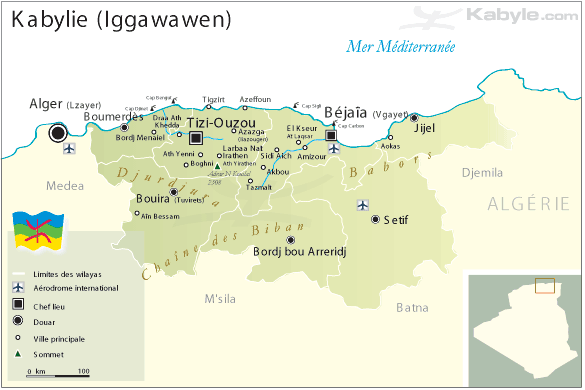
Amid low turn-out and a boycott in regions of the country, Algerians approved a new constitution pushed by President Abdelmadjid Tebboune in a Nov. 1 referendum. The referendum took place on the anniversary of the start of Algeria’s war for independence from France in 1954, with the government adopting the slogan “November 1954: Liberation. November 2020: Change.” The preamble to the new charter actually invokes last year’s Hirak or “revolution of smiles” protest movement, and the reform was clearly intended as a response to the movement’s demands. But in the northeastern Kabylie region, heartland of the country’s Amazigh (Berber) people and a bastion of support for the Hirak, demonstrators blocked polling stations to enforce a boycott. In response, election authorities annulled the votes from 63 of the 67 towns in the region.
The new charter recognizes Tamazight, the Berber language, as a “national” and “official” language, reiterating provisions of previous constitutional reforms in 2016 and 2002. It also adds a call for “promotion” of Tamazight, but states that Arabic is to “remain” the language of “state.” Berber activists rejected this secondary status, as well as continuing provisions recognizing Islam as the official religion; Berbers have often faced prosecution for promoting “atheism.”
However, religious conservatives called for a “no” vote in the referendum, with the Association of Algerian Ulemas asserting that greater protections for the Tamazight language pose a threat to the country’s Islamic identity.
The new constitution includes a two-term limit for the president and members of parliament. It devolves some powers from the executive to parliament and the judiciary. It also calls for creating an anti-corruption body; limiting state-of-emergency decrees to 30 days; and making it easier to form new political parties.
However, it does little to circumscribe the power of the military, which remains the central institution in Algerian politics. In fact, the new constitution gives the military powers to intervene outside Algeria’s borders, with the generals concerned about unrest in neighboring Libya and Mali. (Jurist, North Africa Journal, Arab Reform Initiative, VOA, Econostrum, Pledge Times, Morocco World News)





Algeria: Hirak movement remobilizes
Thousands of anti-government protesters took to the streets across Algeria on Friday, Feb. 26, as the “Hirak” pro-democracy movement gathers renewed momentum after a year-long hiatus due to the coronavirus pandemic. (AfricaNews)